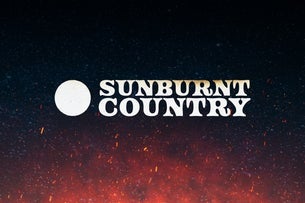Busby Marou Are A 'Walking Billboard' For Queensland
Thomas Busby of Busby Marou explains to Anthony Carew the dualism between their "two big blokes with beards" aesthetic and the sweet harmonies that have come to define their sound.

In 2018, Busby Marou were recruited to soundtrack an advertising campaign reviving that age-old Queensland tourism slogan: "Beautiful One Day, Perfect The Next." It felt like an obvious, natural fit for duo Thomas Busby and Jeremy Marou, who, as Busby says, “sing as though we’re coming from a beautiful, beachy, sunshiney place”.
“We’re Rockhampton boys, Capricorn Coast, born and raised,” Busby offers. “We’ve been touring the world, telling stories, singing songs, and a lot of those stories relate to Queensland, and our experiences from all these hidden gems: tiny islands, isolated beaches, falling in and out of love and getting your heart broken in these landscapes. Growing up, we didn’t realise we were sitting on a gold mine, surrounded by all these tourist spots. But, as we got a bit older, we recognised that, and so did Queensland tourism. In some ways, we’d been a walking billboard for ’em all along.”
On their fourth album, The Great Divide – the duo’s “adult” record, in both sound and theme – Busby Marou evoke a different element of the Queensland landscape. And they do so with due symbolism. “Jeremy and I are from totally different walks of life,” Busby explains. “He’s a Torres Strait Islander, I’m a whitefella from Rockhampton. We’ve got a lot of similarities, but there’s a great divide between the way we were brought up, the way we were treated, our cultural influences.
“But [with this album], we wanted to make a positive statement about that. It’s not about a division between white and Black, it’s about our unique stories, our colourful differences, and how that doesn’t keep us apart. It’s, in a way, about reconciliation. But we don’t wanna harp on about that. We just want to lead by example, by our actions, more so than what we say. At the end of the day, we’re a couple of Aussie blokes who happen to be great mates. He’s Black, I’m white. That should be a good enough action.”
In their early days, Marou was, at times, uncomfortable to get a gig or receive funding as a 'First Nations act' —“He’d say, ‘I’m a good enough guitarist, we’re a good enough band’”— and would sometimes shirk the label. “He’d always say: ‘We don’t have clapsticks in the songs, we don’t have didgeridoos, we don’t have an Indigenous sound,'” Busby recounts.
But Marou’s heritage was an undeniable influence on the band; if only because he grew up performing cultural, Christian, and country songs, and was almost oblivious to pop culture. When they were starting out, endlessly playing pubs around Rockhampton, Busby discovered that any song he wanted to cover – The Rolling Stones, Neil Young, John Denver, Powderfinger – Marou could instantly play, but would have never heard it before. “I quickly learnt that, if I wanted to cover a song, never to play him the original,” Busby says. “It was amazing hearing him come to this song, fresh, with his own ideas, his own unique style.”
It was while recording their debut EP, 2007's The Blue Road, that the band – at the behest of its late producer, Anthony Lycenko – realised that their songs always needed to centre around how they were created: with two guys playing guitars and singing together. Through the years, it’s the vocal harmonies of Busby and Marou, that’ve come to define Busby Marou.
"We’re boys’ boys. But, here we are, singing this beautiful, sentimental music.”
“Jeremy has this way of singing that makes everything sound sunny,” Busby offers. “[There’s something in] the way we both sing together. It’s quite a beautiful thing. Even when we’re singing sad songs, or singing break-up songs, people request to use them at their weddings, as they’re walking down the aisle. Of course, we never tell them what they’re really about. But that’s the beauty of music.
“Jeremy and I do a lot of our tours just as a duo. Even when we tour with a band, we don’t jump on the electrics. We really try to highlight that acoustic way it was written. It must be a visually confusing thing: it’s two big blokes with beards, one blackfella and one whitefella, singing these sweet harmonies. We’re a couple of blokes who love a beer, talk a lot of shit, and carry on. We’re boys’ boys. But, here we are, singing this beautiful, sentimental music.”








